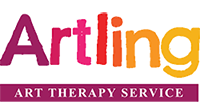What is Art Therapy?
Art Therapy is a form of Psychotherapy that uses art as its primary form of communication. The overall aim is to enable a client to effect change and growth on a personal level through the use of art materials in a safe and facilitating environment. Using art materials to make images, which can be thought about with a qualified and registered art therapist, may help relieve difficult or painful feelings and can help increase general wellbeing.
Artling offers a range of creative and therapeutic services to schools, groups and individuals to help develop positive emotional wellbeing and a ‘whole school approach’ towards a better understanding of positive mental health.
Art therapy helps individuals express themselves and explore difficult thoughts and feelings. It supports individuals through times of emotional stress, providing an active therapeutic practise that enables positive change.
Artling works to bring people together through fun and innovative community projects, providing learning opportunities from collective experiences and stories.
Do I need to be good at art?
No art skills are required to benefit from Art Therapy. The art therapist can help individuals get started, and suggest creative activities depending on the abilities of each client.
Is the artwork analysed?
The client and art therapist discuss the process of making, and the artwork itself. In this way, the art therapist helps clients to find their own meaning of the artwork.
How can you prove it works?
There is a vast body of both qualitative and quantitative evidence based practice that underpins the process of Art Psychotherapy. Art therapists must demonstrate that their practice is informed by research and other forms of evidence derived from quality assurance procedures. At Artling we use a variety of different evaluation tools to help prove it works. Ultimately if someone says they feel better because of art therapy there is no better evidence than that.
Who is art therapy for?
Art therapy is for everyone. It is helpful for children from the age of 3 years old all the way through childhood and adulthood to old age.
How long does the process last for?
Sessions are typically on a weekly basis and are usually 50 minutes for an individual client and 90 minutes for a group. Shorter sessions are usually suggested for children. Artling offers both short and long term therapy. Some clients find that a few sessions are helpful enough, where as others might require longer-term therapy.
Are art therapists qualified professionals?
Art Therapists undertake a degree, possibly a Master’s, incorporating theoretical and experiential components. All art therapists undergo personal therapy themselves as part of their training. Registration with the HCPC (Health & Care Professions Council) is a rigorous legal requirement, since 2001, for Art Therapists practising in the UK. The register and the standards of education, conduct, performance and ethics, that are laid down by HCPC aim to protect members of the public who use the services of the registered professions.
Artling therapists…
At Artling we maintain professional standards and are registered with both the HCPC and the BAAT (British Association of Art Therapists). Artling therapists also have enhanced, and regularly updated, portable DBS checks for working with vulnerable individuals. Artling therapists receive robust supervision from an experienced supervisor to safely oversee their work.
